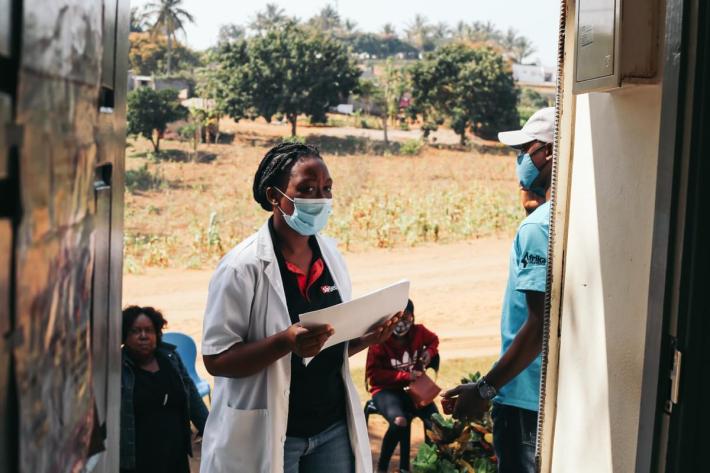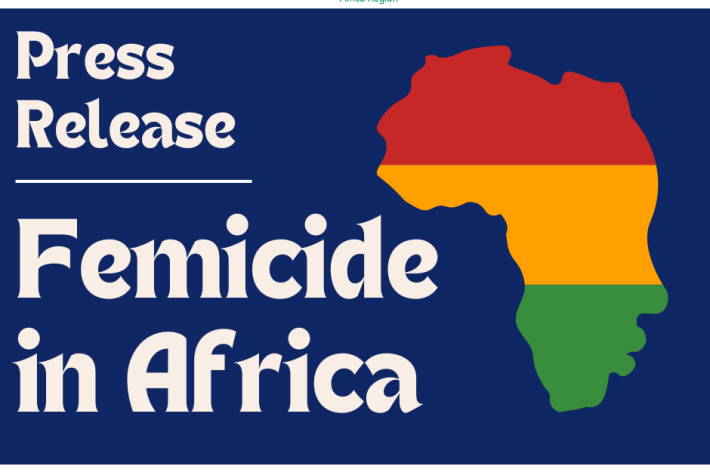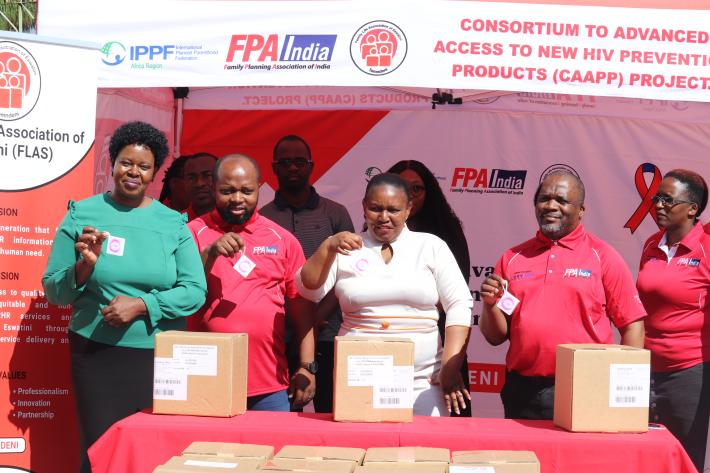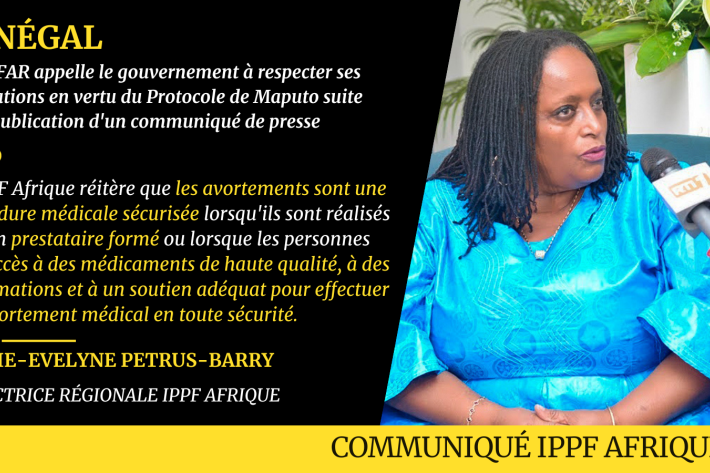Latest press releases
A selection of stories from across the Federation
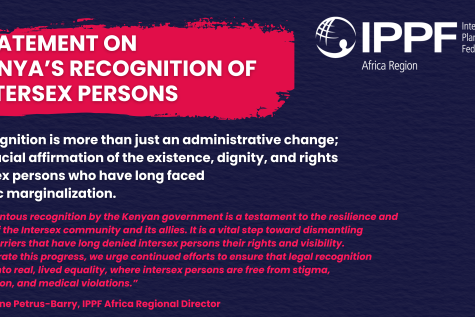
Kenya
IPPF Africa Region Welcomes Kenya’s Landmark Recognition of Intersex Persons
IPPF Africa Region Welcomes Kenya’s Landmark Recognition of Intersex Persons Nairobi, Kenya: 13 February 2025 – On 31 January 2025, Kenya has taken a groundbreaking step towards inclusivity and human rights by officially recognizing intersex as a sex marker alongside male and female in the Kenya Legal Notice 153 of 2025.


| 28 March 2022
High Court Judgement in Malindi Protects Women, Girls and Healthcare Providers from Arbitrary Abortion-Related Arrests and Prosecutions
March 26, 2022 (MALINDI) – In a landmark verdict today, the High Court of Malindi has ruled that safe abortion care is a fundamental right under the Constitution of Kenya and that arbitrary arrests and prosecution of patients and healthcare providers, for seeking or offering such services, is completely illegal. Specifically, the Court ruled that: Abortion care is a fundamental right under the Constitution of Kenya and that arbitrary arrests and prosecution of patients and healthcare providers seeking or offering such services is illegal. Protecting access to abortion impacts vital Constitutional values, including dignity, autonomy, equality, and bodily integrity. Criminalizing abortion under Penal Code without Constitutional statutory framework is an impairment to the enjoyment of women’s reproductive right For years, women and girls in Kenya have faced sustained and pervasive discrimination hampering their access to seeking reproductive healthcare services; the 1963 Penal Code criminalizes all abortion care, including those allowed under the Constitution 2010, which guarantees the right to healthcare, including access to reproductive health services. The Constitution only permits safe abortion if in the opinion of a trained health professional, there is need for emergency treatment, or the life or health of the mother is at risk/in danger. The court case in question, filed in November 2020, involved PAK, a minor 16 years of age from Kilifi County. PAK experienced complications during pregnancy and immediately sought medical care at a nearby clinic where a trained clinical officer attended to her. Upon examining her, the clinical officer determined that she had lost the pregnancy and proceeded to provide her with essential and life-saving post-abortion care. Policy officers stormed the clinic, in the midst of the treatment, stopping the medical procedure and confiscating PAK’s treatment records. They then proceeded to illegally arrest both PAK and the clinical officer. Both were taken to Ganze Police Patrol Base where PAK was not allowed to access further medical care for the next two days and was forced to sign a statement which was contrary to PAK’s description of the events. The police also forced PAK to undergo another detailed medical examination at Kilifi County Hospital to obtain evidence to prove the alleged offence of abortion. The clinical officer was detained for one week while PAK was remanded to a juvenile remand for more than a month, whilst she and her family sought to secure the cash bail for her release. The Malindi High Court has further directed the Parliament to enact an abortion law and public policy framework that aligns with the Kenyan Constitution. Additionally, the Court has confirmed that communication between a patient and the healthcare provider is confidential, which is guaranteed and protected under the Constitution and other enabling laws, save for where the disclosure is consented to by the patient or is in the public interest in line with the limitations as provided for in the Constitution. In its decision, the Court also ruled that PAK was recovering from medical procedure and police did not have the medical qualifications to determine and confirm that she was medically-fit to leave the clinic, regardless of her admission status at the clinic. Additionally, the Court found that PAK’s arrest was inhuman and degrading, and being a minor, she ought not to have been interrogated without legal representation. Evelyne Opondo, Senior Regional Director for Africa at Center for Reproductive Rights said, “Today’s victory is for all women, girls, and healthcare providers who have been treated as criminals for seeking and providing abortion care. The court has vindicated our position by affirming that forcing a woman to carry an unwanted pregnancy to term or to seek out an unsafe abortion is a gross violation of her rights to privacy and bodily autonomy. Further, the continued restrictive abortion laws inhibit quality improvement possible to protect women with unintended pregnancies.” Nelly Munyasia, Executive Director of Reproductive Health Network Kenya (RHNK), a network of reproductive health providers whose member was the second petitioner in this case, welcomed the court’s decision. “Many qualified reproductive healthcare practitioners continue to be arrested, detained, and prosecuted for providing legal medical care. The court’s decision confirms that prosecution against health providers cannot hold where the prosecution has not established that; the health professional in question was unqualified to conduct the procedure; the life or health of the woman was not in danger or the woman was not in need of emergency treatment,” Ms. Munyasia said. Marie-Evelyne Petrus-Barry, Regional Director from the International Planned Parenthood Federation of whom Reproductive Health Rights Network Kenya is a collaborative partner added: “We are absolutely delighted to hear this news and applaud the High Court of Malindi's ruling confirming that abortion care is a fundamental right under the Constitution of Kenya and that arbitrary arrests and prosecution of patients and healthcare providers for seeking or offering such services is illegal. We are also very pleased to hear that the Court has directed Parliament to enact an abortion law and public policy framework that aligns with the Constitution. This is a victory for women and girls not only in Kenya, but across Africa! Access to quality abortion is essential to guarantee the health and reproductive rights of women and girls everywhere. At IPPF, we are committed to reducing the number of deaths of women and girls who are forced to turn to unsafe abortion methods for fear of arrests and harassment. We will continue to supply and support safe and legal abortion services and care for women and girls everywhere.” The petitioners were represented by the Center for Reproductive Rights advocates Martin Onyango, Head of Legal Strategies for Africa, and Prudence Mutiso, Legal Advisor for Africa. Center fact sheet: “The Impact of the Misalignment Between Kenya’s Constitution and the Penal Code on Access to Reproductive Health Care”

| 04 March 2022
Opinion: It's time to permanently repeal the 'global gag rule'
By Caitlin Horrigan, Marie-Evelyne Petrus-Barry. In January 2021, the global health, human rights, and gender equity communities waited with bated breath for U.S. President Joe Biden to keep his election promises and repeal the harmful Mexico City Policy, also known as the “global gag rule.” The devastating policy had been radically expanded under former President Donald Trump to bar international recipients of any U.S. global health funding from using their own funds to provide abortion care or to engage in counseling, referrals, or advocacy related to it. This version of the global gag rule restricted partnership on roughly $12 billion and impacted a range of lifesaving health care services worldwide, including those related to HIV, maternal health and nutrition, sexually transmitted infections, and vulnerable children. The flip-flopping of U.S. foreign policy with each presidential party change has played politics with the health and lives of people across the globe for nearly 40 years. Perhaps most unfair is the intrinsic neocolonialism of the policy, disproportionately impacting Black and brown women and girls in low-income countries with already limited access to high-quality health services, including safe abortion care. For example, while Africa accounts for 29% of all unsafe abortions, “it sees 62% of all abortion-related deaths,” according to the World Health Organization. January 2022 marked one year since Biden rescinded this harmful and unfair policy. Still, while rescinding is a positive first step, the looming threat of reinstatement under future anti-rights administrations continues to undermine the sustainability of global health programs and the pace of progress. More than this, the devastating consequences of the global gag rule do not simply go away. Research from 26 African countries found that during former President George W. Bush’s administration, the global gag rule eroded access to vital sexual and reproductive health care, leading to a 14% reduction in modern contraception use and a staggering 40% rise in abortions among countries highly affected by the policy. Many of these abortions were likely to be unsafe, with potential consequences including lifelong disabilities or even death. Under Trump’s reinstatement of the global gag rule, Ugandan health facilities with more exposure to the policy supported an average of four fewer community health workers than facilities with less exposure to the rule. Such gaps have decreased access to family planning services and the crosscutting health services delivered alongside them. With approximately 218 million women in low- and middle-income countries having an unmet need for family planning and tens of millions of unsafe abortions already performed each year, the sharp decline in sexual and reproductive health care under the global gag rule only adds to disastrous yet sadly preventable outcomes. For the International Planned Parenthood Federation, the global gag rule under Trump meant losing critical support from the U.S. government, impacting 53 health care projects across 32 countries. In some member associations, service delivery decreased by up to 42% from 2016 to 2017, and it will take years to build back to the same capacity. For IPPF’s member association in Mozambique, known by the abbreviation AMODEFA — a national provider of sexual and reproductive health care in the country since 1989 — the impact of the global gag rule meant a $2 million gap in funding, representing about 60% of its total budget. The impact was almost instantaneous, forcing the closure of six programs across 12 districts in Mozambique. This denied nearly 390,000 clients access to services related to contraception, STIs, HIV, malaria, and tuberculosis. Almost every local population was affected, with closures impacting adolescents, youths, women, and marginalized populations. But now, the U.S. Congress has a golden opportunity to change the status quo and permanently repeal the global gag rule, with a supportive White House and the policy change having passed the House of Representatives and enjoying bipartisan support in the Senate. Building on Biden's action, on March 8 lawmakers can finalize and pass language to permanently repeal the policy as part of the fiscal year 2022 spending bill, which also includes increased funding for international family planning programs and the United Nations Population Fund, the U.N. sexual and reproductive health agency. Permanently repealing the global gag rule would positively transform the health and lives of millions of people worldwide. By preventing the flip-flopping of U.S. foreign policy from controlling access to lifesaving health care services, unintended pregnancies would decrease worldwide, the number of unsafe abortions would be reduced, maternal and child deaths would be prevented, and more girls could stay in school. Ending the global gag rule is also popular, and polling undertaken by the Garin-Hart-Yang Research Group shows that 70% of Americans support it. Alongside them, permanent repeal is supported by over 150 diverse organizations in the U.S. working across the health care, human rights, and gender equality sectors, with further support from around 200 global organizations from dozens of countries across six continents. The global gag rule is a callously designed political tool set up to deny women, girls, and marginalized people the right to decide what happens to their bodies. By permanently repealing the policy and standing up for the futures of millions, the U.S. will leave a legacy that gives hope and stability to the health and rights of people worldwide. And for those affected by this awful policy, change can't come soon enough. Read the original article on Devex. Marie-Evelyne Petrus-Barry is the Africa regional director at the International Planned Parenthood Federation. Born in Guadeloupe, she has over 30 years of international human rights experience and leads her team to advocate, promote, and deliver sexual and reproductive health and rights in 42 sub-Saharan countries. Her leadership helps ensure that IPPF Africa Region, through locally owned organizations, protects and safeguards the rights of the most vulnerable in society. Caitlin Horrigan is the director of global advocacy at Planned Parenthood Federation of America. With over a decade of foreign policy experience, Caitlin drives PPFA’s global advocacy agenda with the U.S. Congress and administration to protect and expand funding and policies that advance sexual and reproductive health and rights worldwide.

| 19 January 2022
African Girls Summit 2021: IPPF reaffirms its commitment to eliminate all forms of violence against women and girls
Organised by the African Union Commission, the African Girls' Summit aims to accelerate the realisation of girls' rights, including the elimination of harmful practices such as female genital mutilation, early marriage, and breast-bandaging, as well as their rights to education and sexual and reproductive health. This is the third summit under this theme, the first edition having been held in Lusaka, Zambia from 26 to 27 November 2015, and the 2nd summit in Accra, Ghana from 21 to 24 November 2018. During the opening ceremony, the Representative of the UN Secretary-General's Special Envoy on Violence against Children, Ms. Najat Maalla M'Jid, shared a strong message: "We must keep in mind that Africa's children and youth are Africa's capital, Africa's richest source of wealth, with a population that is growing and is expected to reach 830 million by 2050". In his speech, Niger’s Head of State, Mr. Mohamed Bazoum, said that the theme of the summit confirms "the commitment of African countries to work together for human development on the continent by relying in particular on women and youth.” According to him, "We have, through this meeting, the opportunity to analyse, monitor and better guide the actions of our States in terms of protection of the human rights of girls who constitute an important part of the population of our countries.” IPPF participated through the intervention of its African Regional Director, Ms. Marie-Evelyne Pétrus-Barry, during two panels, respectively on the themes: "The impact of COVID-19 on women and girls: an integrated response" and "Young people engage with Member States to end harmful practices". During these exchanges, the Regional Director reaffirmed "IPPF's commitment to eliminate all forms of violence against women and girls, to protect their rights and to ensure the provision of and access to the services and information necessary to protect their health and well-being". She stressed the devastating impact of harmful practices on women's and girls' sexual and reproductive health, as well as their mental and psychosocial health: "Female genital mutilation and child marriage are both linked to high rates of maternal mortality and low use of family planning leading to unwanted pregnancies. They deprive women of the opportunity to be educated, to become imaginative, innovative and creative, to open up to new possibilities, and to enjoy the full benefits of decent work for themselves and their families.” She also noted the work of its Member Associations in being innovative and resilient to the challenges of COVID-19. "They have, among other things, simultaneously developed telemedicine, door-to-door and their mobile clinics to meet the SRH needs of confined women, digitised sex education for young people deprived of school, etc." She also celebrated the work of young people and thanked them for their actions in promoting sexual and reproductive rights on the continent: "Thank you young women and men, thank you for all you are doing today, and for the many things you will still accomplish. I have great admiration for you, and I think I speak for many people of my age when I say that we admire you and are ready to learn from you.” It is IPPF's duty to support young people, especially young women and girls, and to give them all the support they need to realize and implement their collective commitments to sexual and reproductive rights. IPPF is, and will remain, at their side.

| 19 January 2022
Guinea: Horrific cases of rape and murder of girls must urge authorities to strengthen their efforts to prevent and combat sexual violence Primary tabs
Guinean authorities must take immediate measures to ensure thorough and impartial investigation of recent rapes and sexual assaults followed by murders committed over the course of just eight days and bring perpetrators to justice, Amnesty International and the International Planned Parenthood Federation (IPPF) said today. They must also increase their efforts to fight sexual violence by strengthening prevention, supporting access to justice for survivors and adopting a special law on violence against women. Six girls aged between three and 16, and a woman were sexually assaulted, and some were raped between 25 November and 2 December 2021. Two of the girls have died as a result of the violence. “Rape is all too commonplace in Guinea. Authorities should urgently strengthen their efforts to prevent and combat sexual violence in Guinea," said Samira Daoud, Amnesty International West and Central Africa director. Rape of girls On 2 December 2021, the Office for the Protection of Gender, Childhood and Morals (OPROGEM) presented a 24-year-old man charged with the rape of a three-year-old girl in the district of Gbessia in the capital Conakry. On 30 November another three-year-old girl was raped in Batè-Nafadji in the eastern region of Kankan. On 27 November, a 12-year-old girl was raped by two men on her way home in the town of Sanoun. This came just a day after the death of another 12-year-old girl in the north-eastern town of Siguiri. In the urban commune of Labé, west-central region of Guinea, a three-year-old girl was gang raped on 26 November. Local organization, "Agir pour le Droit Féminin", which met with the three-year-old girl's parents on 7 December, told the organizations that she was abducted when going to buy candy not far from the family home. She was then taken to an uninhabited house and sexually assaulted until she died. The girl’s father who met with the prosecutor confirmed his demand for justice for his daughter. One of the alleged perpetrator’s father requested forgiveness from the girl’s family but they refused. The rapes of girls followed the rape of a woman on 25 November while she was in a hospital in the north-western town of Kamsar for a surgery. The hospital management announced three days later they had "arrested the alleged perpetrator" -who is an external service provider- and taken him to the gendarmerie. The same day, a 16-year-old girl was also raped by several men in Kankan. “The authorities must ensure thorough and impartial investigations of these rape cases without delay and anyone found guilty must be brought to justice," said Marie-Evelyne Petrus-Barry, IPPF Africa Regional Director. “Survivors must receive access to medical care and psychosocial support as well as legal aid to access justice and redress.” More than 331 rape cases reported since the beginning of the year Since the beginning of the year, OPROGEM and the Special Brigade for the Protection of Vulnerable Persons (BSPPV in French) have already dealt with 331 rape cases. In 2020 alone, they dealt with 374 cases, a number which reflects only the tip of the iceberg according to NGOs working on sexual violence survivors, journalists, police and gendarmerie. This is due to the stigma associated with rape in Guinea, which often leads to not reporting the crime and not filing complaints, and often such cases are handled through mediation and out-of-court settlements between the victims or their families and the alleged perpetrators or their families. The recent rape cases follow another case that sparked a strong public reaction across the country last month. M’Mah Sylla, a 25-year-old woman, was allegedly raped by doctors at a non-licensed clinic in Conakry, where she went for treatment. She got pregnant as a result, and the same perpetrators raped her again when she returned to the clinic to seek an abortion. The rape caused injuries that could not be healed despite seven surgeries. The victim died on 20 November in Tunis (Tunisia) where she was medically evacuated following a government intervention. Following M’Mah Sylla’s death, women staged protests on 22, 24 and 30 November in the towns of Labé, Kindia and N’Zérékoré, demanding justice for all victims of rape. On 21 November, the Ministry of Justice said three of the four alleged perpetrators of M’Mah Sylla’s rape had been detained in Conakry prison. The government also presented its condolences to her family on behalf of the head of state. Activists spoke out on the surge in rape cases. Djenab Boiro of “Mon Enfant, Ma vie” a local organization, told Amnesty International during a meeting in Conakry: “Even dead, M'Mah Sylla deserves justice. I am convinced that the day the perpetrators will be sentenced to the punishment they deserve, her soul will finally rest in peace. We have had too many cases like M'Mah Sylla’s and we hope and dream of not having any more.” “Authorities have taken some steps in the right direction in recent years which we welcome, such as the creation in 2020 of a special unit within the gendarmerie to fight sexual violence. In addition, local women’s rights organizations have played and continue to play a major role in speaking up against sexual violence, together with some media,” said Samira Daoud "Despite this situation, the persistence of rape cases, especially of girls, calls for much greater efforts to raise awareness among the public to prevent sexual violence, to protect the survivors, and ensure their timely access to justice and reparations as well as to bring perpetrators to account. This includes but is not limited to the adoption of a special law on violence against women, as recommended by the CEDAW Committee,” concluded Marie-Evelyne Petrus-Barry. Read this article in French here. To arrange an interview, please contact: Amnesty’s Press Office Email [email protected]; West and Centra Africa’s Twitter: @AmnestyWaro; and/or IPPF Africa Region Lead Communication Advisor, Mr. Mahmoud Garga ([email protected])

| 17 January 2022
A Huge Victory for LGBTIQ+ Equality in Botswana: Court Upholds Ruling Decriminalizing Same-Sex Relationships
Nairobi, 30 November 2021 - The International Planned Parenthood Federation (IPPF) and the Botswana Family Welfare Association (BOFWA) celebrate and welcome Botswana’s Court of Appeal’s decision to uphold a 2019 ruling that decriminalized same-sex relationships. On Monday 29 November 2021, five judges from the Court of Appeal unanimously ruled that criminalising same-sex relationships was a violation of the constitutional rights of Lesbian, Gay, Bisexual, Transgender, Intersex and Queer (LGBTIQ+) individuals to dignity, liberty, privacy and equality. The offending sections of the Penal Code have been removed accordingly, as they were found to violate liberty, privacy and dignity and cause undue discrimination to the LGBTIQ+ community. This decision has affirmed Botswana’s commitment to uphold the democratic rights of all its citizens, including their full and complete sexual and reproductive health and rights (SRHR). This appeal was the third to be heard by the full bench of the court of Appeal concerning constitutionality of the state actors, or sections of statutes challenged as breaching the fundamental rights of members of the LGBTIQ+ community. BOFWA, a member association of IPPF, plays a leading role in providing and championing access to high-quality and integrated SRHR for all those who are marginalised, underserved and in particular those groups who are often left behind. These communities include vulnerable and key populations such as the LGBTIQ+ communities and sex workers. In Partnership with SRHR and LGBTIQ+ activists, BOFWA advocates for the SRHR of all people of Botswana, regardless of their sexual orientation, gender identity or status in society. Over the years, BOFWA has argued that criminalization of same-sex relations and associated stigma and discrimination gravely reduces access to SRHR services, including HIV interventions and other sexually transmitted infections. A distinguished leader in the SRHR sector, BOFWA was the first non-governmental organization in the country to provide antiretroviral treatment to key populations. Ms. Una Ngwenya, BOFWA’s Executive Director, expressed jubilation at the Court of Appeal’s decision. “The ruling will go a long way in addressing issues of stigma and discrimination against members of the same-sex community in Botswana. We believe that this decision will inspire members of this community to freely seek SRHR services and go on with their lives like everyone else; they don’t need labels but rather targeted and differentiated services! Still, we will not sit on our laurels, it is not over yet, members of the same-sex community face various challenges beyond the law; attitudes of service providers, moralizing sex and sexuality and complexities surrounding sexual and gender-based violence among communities remain critical. While we welcome the Court of Appeal’s judgement, we urge the Government to put in place stringent measures across the country’s health care system that will address the barriers and disparities preventing the LGBTIQ+ community’s access to sexual and reproductive health services. Equally, we call for the guaranteed safety and protection of our fellow civil society movements that continue to fight barriers and disparities that hinder this community’s access to sexual reproductive health services,” she says. Ms. Ngwenya adds that BOFWA and IPPF will not relent in their quest to advocate for SRHR-related issues, including laws that provide access to safe abortion and decriminalize sex work. “IPPF welcomes Botswana’s ruling in favour of LGBTIQ+ equality and encourages other African countries to follow it. We reiterate our commitment to building the capacities of all our Member Associations, their partners and stakeholders, in ensuring that the sexual reproductive health and rights of all citizens across the world are upheld, unreservedly,” said Marie-Evelyne-Petrus-Barry, IPPF Africa Regional Director. END Media Contacts: -Mahmoud Garga, Lead Specialist - Strategic Communication, Media Relations and Digital Campaigning, IPPF Africa Regional Office (IPPFARO) – email: [email protected] -Phone +254 704 626 920 Maryanne Wanyama, Communications Office, IPPFARO, Nairobi (Kenya) - Email: [email protected] – Phone: +254 707 952 990 ABOUT IPPF AFRICA REGION (IPPFAR) The International Planned Parenthood Federation Africa Region (IPPFAR) is one of the leading providers of quality sexual and reproductive health (SRH) services in Africa, and a strong and resolute sexual and reproductive health and rights (SRHR) advocacy voice in the region, committed to gender equality and to ensuring that women, girls and young people realize their rights and have control over their own bodies, their lives and their futures. Headquartered in Nairobi, Kenya, the overarching goal of IPPFAR is to increase access to integrated SRHR services to the most vulnerable youth, men, and women in sub-Saharan Africa. Supported by thousands of volunteers, IPPFAR tackles the continent’s growing SRHR challenges through a committed network of Member Associations (MAs) in 40 countries. We do this by supporting and empowering the MAs into efficient entities with the capacity to deliver and sustain high-quality, youth-focused and gender-transformative services. We work with governments, the African Union, Regional Economic Commissions, the Pan-African Parliament, United Nations bodies among others to expand political and financial commitments to sexual and reproductive health and rights in Africa. Learn more about us on our website. Follow us on Facebook, Twitter, Instagram and You Tube.
Pagination
- First page
- Previous page
- …
- 9
- 10
- 11











